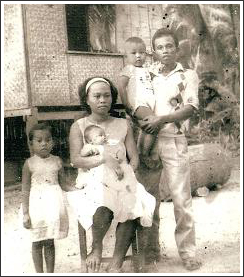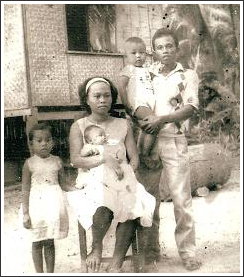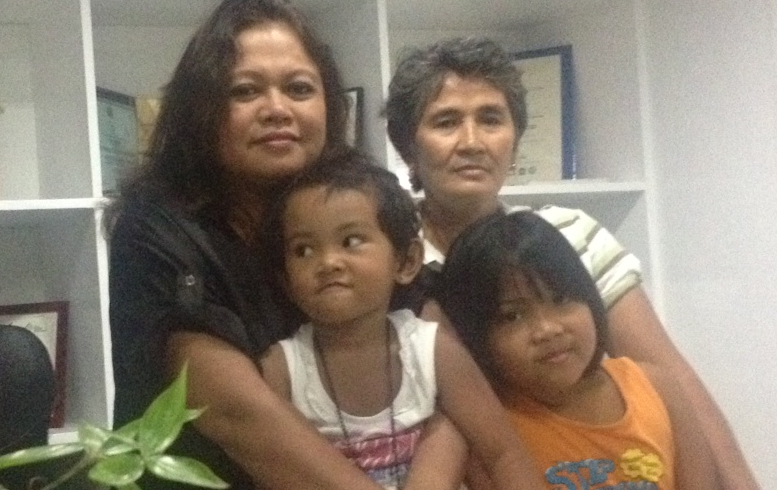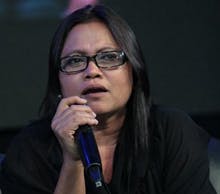Remembering the Sisters I Left Behind - Part 1 of 3
Jul 3, 2018
Story



As a young girl, I was the victim of human trafficking. Today, I own an Information Technology business with a focus on mobile and social media technology. Along the way, I spent 20 years working as a domestic helper and nanny in Singapore, Taiwan and Hong Kong and became involved in community service by founding the Mindanao Hong Kong Workers Federation. Today, I am a 53 year old woman weaving the web. My advocacy is to empower millions of the most vulnerable women among us to join in the world’s fight against human trafficking and modern day human slavery. Forgive me for telling my story over a series of three posts, but to understand my advocacy, it will help to understand how I got here and why a woman, now empowered with technology, is compelled to act on behalf of the sisters she has left behind. A woman from the Masa… I am Myrna Y. Padilla, a proud woman of the Masa. I was born to the poorest of the poor in a small, undeveloped fishing village on an island in the Philippines in 1960. I have only one picture of me and my family when I was a little girl. I will attach it to this post. We are standing in front of a small bamboo hut. The hut was my childhood home and located just a few meters away from the Bohol Sea. I am standing to the left of my mother and wearing one of the finest dresses I have ever owned. It was made with a mother's love from a flour bag bleached white. My father was a simple fisherman from the island of Bohol and my mother was from the island of Mindanao. I was the eldest of six children. My childhood… Some of my earliest memories are the tears in my mother's eyes when we would go to bed hungry. I know from personal experience the ugly face of poverty. By the time I was 10 years old, to help feed my family, I was diving alone in the sea to hunt for fish using a spear gun made by my father from an old umbrella. For money, I would dive for seaweed to sell in the market in the nearby town of Loboc. When we would go into town to sell our seaweed, the old women would tease me. I still hear them saying, no one would ever marry such a ugly little girl. Diving in the sea under the hot sun made me so dark. And bathing in the salt water would leave white patches on my skin and frizzle my hair. I was pitiful looking. Out of respect for my elders, I never fought with the old women of the market stalls. Instead, I learned to make them smile by singing and talking and joking with them. Over the years, I gained their respect and by the time I was a young teenager, I was even called upon to speak on their behalf. The town children were like children everywhere. They can be so cruel to those who are different from themselves. And we were different. We were village people. Even though they were poor, we were the poorest of the poor. As the eldest, it soon became my job to protect my younger sisters. There was no singing. I learned to fight. And the town boys soon learned, I was deadly with a rock at 20 meters. And, believe it or not, by the time I was a young woman, some of those town boys proclaimed their love for me. I loved to sing... There was only one way for a child to sell seaweed in the market without the capital for a stall, you had to be a street vendor. A street vendor cannot be shy. You have to be fearless. I learned to talk with strangers. Make them smile. Sing them a song. I soon learned that I could make more money singing than selling seaweed. I started singing in competitions at local festivals. It was after one of these festivals that I was approached by a “Recruiter” from Manila. She told me the same story that a thousand young girls have been told. She told me I was beautiful. She told me I was special. She told me I could get a job singing in Japan. She told me such beautiful lies. Finally, she told me something I did believe. She told me I could help save my family from poverty. She gave me hope and a dream and I found myself believing in her with all my heart. Because I had nothing to wear suitable for the city, my father gave me his best pair of pants and his best shirt. They were far too big for me, but I felt so safe wrapped inside them. I went with her to Manila wrapped in my father’s clothes. I was a slave... In Manila, I soon discovered I had misunderstood everything. Before she could arrange an audition for me to go overseas and sing in Japan, I had to first pay off “my debt”. She had gone through so much trouble to get me there. There were transportation costs. And “recruitment” fees. And singing lessons. And she had to feed me. At that moment, I thought I understood everything. I would be the hardest worker she ever had. I would repay my debt. I was so deeply grateful and I could not stop thanking her. I was so naïve. She had given me hope and a powerful dream. I would save my family from poverty. I spent the next year working as a slave (there is no other word for it) washing cloths by hand. Twelve hours a day. Seven days a week. No day off. No pay. No singing lessons. They never beat me, only because they quickly learned I would fight back. And I was obedient and never complained. The hard work meant nothing to me. I had long become use to it. I practiced my singing while I washed the clothes and I dreamed. Soon I was joined by a young girl named Ling Ling. Four years younger than me. She was from the mountains above my fishing village and we spoke the same dialect. We became best friends. We laughed so much. And night after night we shared our dreams. I would become a singer in Japan. I would save my family. No one would ever go to bed hungry again. The power of hope... As strange as it may sound, I never felt despair. In the years since, I have often wondered how a slave could have joy in her heart. I now know why and it has become a core part of my advocacy. In the Philippines, we call it “pag-asa”. You call it hope. When you give people hope, even a slave can sing. After almost a year, my chance finally came. The recruiter had set up an audition. Ling Ling wished me luck. For the first time in almost a year, I walked out of the compound. We went to a nearby building and through a back door. A young Filipino makeup artist was waiting for me. He fixed me up and had me dress in a beautiful gown. But there was no bra and my bare back was showing. I was so uncomfortable, but he assured me everything was ok. I was an entertainer. My recruiter led me out onto a small stage surrounded by a group of men. She explained the men were my “judges”. Even though I had never seen the inside of a nightclub, I knew in my heart, something was wrong. But I wanted so badly to believe in dreams that I took a deep breath and sang my heart out for them. I sang Frank Sinatra’s “My Way”. Half way through my song, one of my “judges” came up on stage. He ran his hand down my bare back. I knew at that moment that my dream of saving my family from poverty was lost. I knew then exactly what was expected of me and I did what came natural. I slapped him... And it was not a little girl’s slap. It was a hard, full woman's slap delivered with the force of a girl whose first job was pounding rice at the age of nine. It was the hard slap of a girl who had been diving alone in the sea forever. It was the hard slap of a slave who had been washing laundry seven days a week for almost a year. It was a slap that stopped the music and sent the old man staggering. My recruiter screamed and I ran. I grabbed my father’s clothes, ran back to the compound. Said goodbye to Ling Ling and ran away. My miracle... I found my way to an old church in Baclaran, where I spent my first night free, broke and homeless. And for the first time since coming to Manila, I cried. And for the first time in my life, I felt worthless. When you are born to the poorest of the poor you stop crying very early in life. Everything is hard. Life is hard. But this was different. When you are poor, it is rare to have a dream you can almost touch. That night I cried hard for a shattered dream. While I sat there in the church crying, a young woman came to me. She could tell I was not from Manila by the way I was dressed. She sat down by my side and began to comfort me. Her name was Ponyang and she was a domestic helper. She cried with me. After sharing my story with her, she suddenly stopped me; she took both my hands and forced me to look into her eyes. She told me she knew exactly what I had to do. She gave me the name of a bakery and then proceeded to tell me exactly what I needed to say and do to get a job. We both stopped crying and started laughing. It would work. I knew it would. Ponyang, the domestic helper, had given me hope again. That morning I did exactly what Ponyang had told me to do. I went to the bakery and declared to the bakery owner, “I can be the best street vendor you ever had.” Then, instead of shouting out “pandesal” (means bread) like the other vendors do, I sang it out as loud and as beautifully as I could. He laughed so hard, but hired me on the spot. I walked the streets of Manila along Airport Road with a basket of bread on my head, wrapped in my father’s clothes and dodging my old recruiter and her boys. The job was no different than selling seaweed in the market back home. I was good at it and I did become the best street vendor that bakery ever had. A few days after escaping, my friend Ling Ling found me. She had been badly abused. They had forced a hot boiling spoon of rice into her mouth as punishment. I refused to let her go back. I helped her find a place to live until she could return to her family. Looking back on it now, my advocacy began that day. And now that I am older, I shudder at the thought of what could have been. My heart breaks at the thought of the millions of girls who have “recruiters” far more brutal than mine and who do not have the option of fighting . I was so lucky. I now know the Church of Baclaran, where I met Ponyang, was open that night to serve the workers and patrons of the red light district. It is known as the Church of Miracles. My miracle was to be saved by a simple domestic helper who took pity on someone less fortunate than herself. We are not worthless... There are over 50 million women worldwide working as domestic helpers and nannies. I know because, I was one of them for over 20 years. I know how people look down upon us. People sometimes treat us as if the poverty that forced us to take on the work we do is a flaw in our character. It is not. Sadly, it is so easy for us to fool ourselves into thinking we are worthless. We are not. Ponyang’s small act of kindness saved me from despair. Her character and willingness to help someone less fortunate than herself, despite her lowly position, was far nobler than most I have known. Hope... Today, millions of migrant women like Ponyang, scattered all over the world, have become masters of social media and mobile technology to communicate with family back home. I know for a certainty, if we can reach out to these women and ask them to volunteer to help those less fortunate than themselves, they will do so. I know because we have built such a network and have quietly registered over 13,000 volunteers scattered all over the world. When we use technology, combined with community service, to engage these women in the fight against human trafficking, we are helping the women who volunteer every bit as much, as the victims they may save. The very act of the world asking for their help will make them smile and if we can successfully engage them in community service then will have given their lives new meaning that goes beyond the floors they mop or the toilets they clean. Our vision is for the network we create to go beyond the fight against human trafficking. We will learn how to use mobile technology to deliver something so desperately needed. Hope. As a postscript, I never saw Ponyang again, but Ling Ling did find me almost 30 years later. Today she works with me and watches over the children of my employees. She is one sister I did not leave behind. In Part 2, I will share my life as a migrant worker, the discovery of community service and the founding of my IT business. In Part 3, I will share the details of my advocacy and how my team is helping me to weave the web.




